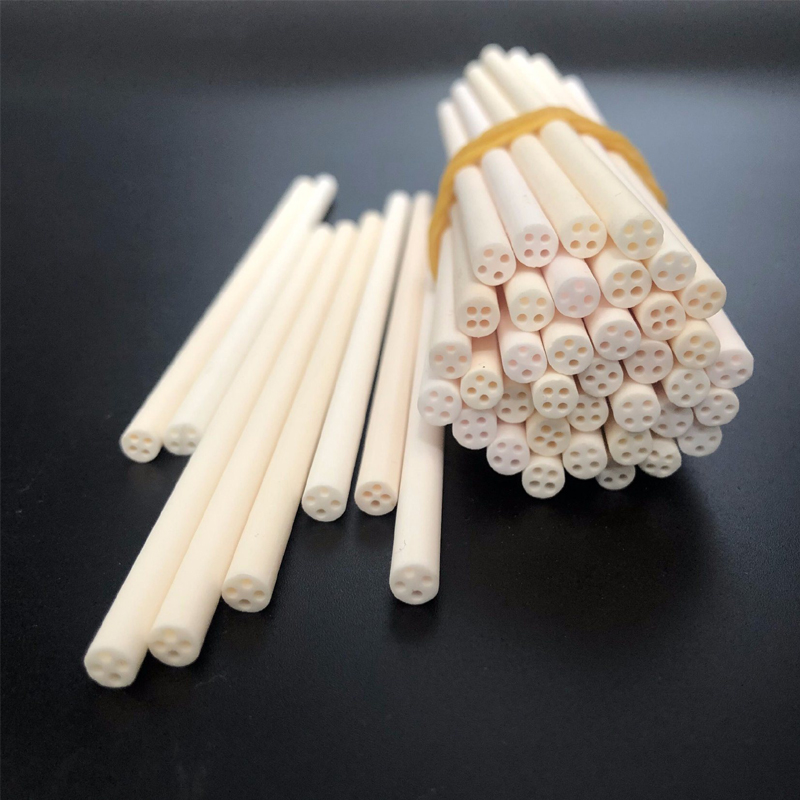The Role of Alumina Ceramic Thermocouple Tubes

As industries worldwide continue to push the boundaries of high-temperature applications, the demand for materials that can withstand extreme conditions while maintaining precision and durability is ever-increasing. Among the various solutions available, alumina ceramic thermocouple tubes have emerged as a critical component in ensuring accurate temperature measurements in environments where conventional materials would fail.
What Are Alumina Ceramic Thermocouple Tubes?
Alumina ceramic thermocouple tubes are specialized protective sheaths designed to house thermocouples, the temperature-sensing devices used extensively in industrial processes. These tubes are made from alumina (Al₂O₃), a material known for its exceptional thermal stability, electrical insulation properties, and resistance to chemical corrosion. With purity levels ranging from 95% to 99.8%, alumina ceramics offer unparalleled performance in environments that demand both high-temperature resistance and material integrity.
Applications Across Industries
The use of alumina ceramic thermocouple tubes spans a wide range of industries, from metallurgy and power generation to aerospace and chemical processing. In metallurgy, for instance, these tubes are essential in furnaces where metals are melted and cast. The ability of alumina ceramics to withstand temperatures exceeding 1,700°C ensures that thermocouples can provide precise readings without degradation or contamination, which is critical for maintaining product quality and process efficiency.
In the power generation sector, particularly in gas turbines and nuclear reactors, the need for accurate temperature monitoring in extreme environments is paramount. Alumina ceramic thermocouple tubes play a vital role in these applications by protecting thermocouples from the harsh conditions within the reactors or turbines, thus ensuring the reliability and safety of the entire system.
Aerospace is another field where these tubes are indispensable. In rocket engines and other propulsion systems, temperatures can soar to levels where only the most resilient materials can survive. Alumina ceramic thermocouple tubes, with their high melting point and resistance to thermal shock, are crucial in providing the necessary data to monitor and control these systems effectively.
Advantages of Alumina Ceramic Thermocouple Tubes
The advantages of using alumina ceramic thermocouple tubes are numerous. One of the most significant is their ability to maintain structural integrity at extremely high temperatures. Unlike metals, which can oxidize, melt, or deform under intense heat, alumina ceramics remain stable, ensuring that the thermocouples housed within them continue to function accurately.
Another key benefit is their excellent electrical insulation properties. In high-temperature environments, where electrical interference can lead to inaccurate readings or equipment failure, alumina ceramics provide a reliable barrier that ensures the purity of the electrical signals from the thermocouples.
Moreover, alumina ceramic thermocouple tubes are highly resistant to chemical corrosion. This is particularly important in environments where the tubes may be exposed to reactive gases or molten metals. The inert nature of alumina means that it does not react with these substances, thereby extending the lifespan of both the thermocouples and the tubes themselves.
The Future of Temperature Measurement
As technological advancements continue to drive the development of more efficient and durable materials, alumina ceramic thermocouple tubes are expected to play an increasingly important role in high-temperature measurement. Research is ongoing to further enhance the properties of alumina ceramics, such as improving their toughness and reducing their thermal expansion, to meet the evolving demands of modern industry.
Additionally, the integration of smart technologies with alumina ceramic thermocouple tubes is an exciting prospect. By embedding sensors and wireless communication capabilities within these tubes, it may soon be possible to monitor temperature in real-time with even greater accuracy and convenience, particularly in remote or hazardous environments.
Conclusion
Alumina ceramic thermocouple tubes represent a vital innovation in the field of high-temperature measurement. Their exceptional properties, including thermal stability, electrical insulation, and chemical resistance, make them indispensable in a wide range of industrial applications. As industries continue to push the limits of what is possible, the role of these tubes in ensuring safety, efficiency, and precision will only grow more significant.
In an era where accurate temperature measurement is critical to the success of countless processes, alumina ceramic thermocouple tubes stand out as a reliable and robust solution, poised to meet the challenges of the future.

